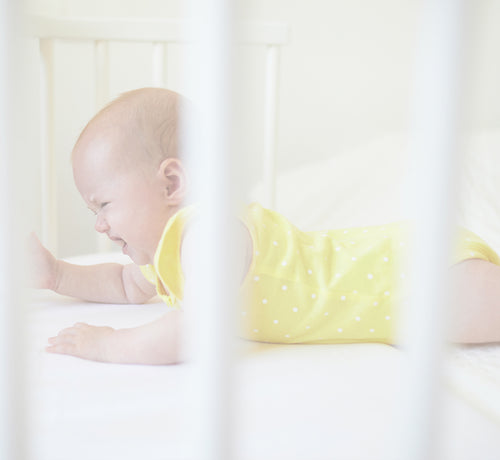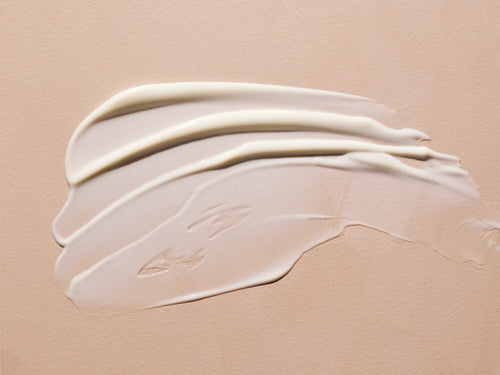Your little one is nine months old and their bedtime routine has been working like a charm. But then, all of the sudden, they’re crying and fussing instead of getting their needed zzzs. Don’t worry. Although it can be difficult for everyone, 9-month sleep regression is totally normal.
In this article, we’ll tell you what 9-month sleep regression is and how to deal with it. Our expert tips should have your little one sleeping like a baby again in no time!
Table Of Contents
- What Is The 9-Month Sleep Regression?
- Reasons For 9-Month Sleep Regression
- How To Deal With 9-Month Sleep Regression
What Is The 9-Month Sleep Regression?
Sleep regression is just what it sounds like. It’s when your baby has had a pattern of sleeping well, but then starts having trouble getting to or staying asleep. Thanks to a number of factors, for nine month old babies, sleep regression is common.
If your little one is having trouble sleeping several days in a row, they could be experiencing a sleep regression. This can last anywhere from days to weeks. It can be a challenging time because, as we all know, if your baby isn’t sleeping well, neither are you.
Baby Sleep At 9 Months

When it comes to caring for your 9 month old, there is a routine for everything. The sleep routine is one of the most important because doing the same things in the same order before putting them down for a nap or for bed makes it easier for your baby to know what to do — sleep!
Their bedtime routine might include a baby massage, bath, or bedtime story, for instance. At nine months old, babies should be sleeping about 12 to 14 hours a day.
Signs Of A 9-Month Sleep Regression
It’s pretty easy to know if your baby is experiencing the 9-month sleep regression. They may have trouble falling asleep or staying asleep. In addition, your little one may be extra cranky, irritable, or crying a lot more than usual.
Reasons For 9-Month Sleep Regression
There are many reasons why your baby might be having a hard time catching their zzzs. First, you want to check the obvious things: is there loud noise outside their window or light streaming into their nursery?
If it’s not something easy to spot like that, their inability to sleep may be due to a sleep regression. Here are several possible causes.
Developmental Milestones
Your baby is growing so much both mentally and physically! At nine months old, baby’s synapses are being formed, allowing them to take in all that’s around them. Your little one is also growing quickly — every day they seem to get bigger.
It’s about this time that you might hear your baby say their first word. Your little one is also developing fine motor skills (those skills they need to pick up their Cheerios) and learning how to stand.
With all this going on, it’s no wonder that their sleep is suffering a bit.
Teething

Babies start teething at about six months of age, so by nine months, they’ve probably cut a number of teeth. This stage can be uncomfortable for your little one because their gums are probably sore.
You’ll know your little one is teething by the fact that they are drooling a lot and trying to chew on everything they can get their hands (and gums) on. Although during the day your little one may be more distracted, at night they may focus on the pain more and have trouble sleeping.
Hunger
As baby starts eating more solid foods, you might not be breastfeeding as much. At this age, parents often make adjustments to their baby’s feeding schedule.
Sometimes babies have a hard time dropping a feeding and get hungry, making sleep more difficult.
Constipation
Your little one is likely eating a variety of solid foods now, and sometimes new foods can be hard to digest. As a result, your baby may experience some bouts of constipation and gas.
If their tummy feels a little crummy, it will be harder to snooze.
Separation Anxiety
Of course, you want your baby to love you, but at nine months, they’ve gotten so used to you being around all the time that they may feel anxious when you close the door after the bedtime routine.
Their separation anxiety could be keeping them up.
Eczema

If your baby suffers from eczema, a very common skin condition, the itchiness may interfere with their ability to sleep.
How To Deal With 9-Month Sleep Regression
If you know what’s causing your baby’s 9-month sleep regression, it will be easier to treat. Here are a few things you can do to help.
Prep Baby’s Room For Sleep
The first thing you want to look at if your baby is experiencing a sleep regression is their room. Ensure that the temperature is set for 68 to 72 degrees Fahrenheit and that it’s nice and dark.
You also might try a white noise machine. The constant sound can provide a nice distraction, relaxing your baby to sleep.
Keep Baby’s Sleep Routine
By repeating the same steps before naps and bedtime, your little one will realize what they’re supposed to do. As we mentioned earlier, baby’s bedtime routine may involve a relaxing bath, a baby massage, and reading a favorite book.
When it comes time to take their nightly bath, Mustela cleansers and lotions can make it even more comforting. Our Gentle Cleansing Gel can soothe and protect baby’s skin while keeping their natural oils intact, while our Baby Oil can moisturize their skin, preparing them for bedtime.
Make Adjustments To Bedtime
If your little one is having a hard time getting to sleep, it’s possible that their bedtime is too early or too late. Adjusting their sleep schedule by as little as 15 minutes to a half-hour may help.
Maintain Proper Wake Windows
A wake window is the time between the end of one sleep period and the beginning of a new one — in a nutshell, it’s how long they can be awake without getting overtired.
Making sure your baby has the proper wake window for their age can help reset their sleep habits. At nine months old, your baby’s wake window should be 2.5 to 3.5 hours long.
If your baby is awake longer than that at any given time, try adjusting their schedule to meet this guideline.
Address Teething Issues

As we mentioned earlier, when your little one is teething, their gums can feel very sore. Here are some things you can do to give baby relief from the teething pain:
- Offer them a rubber teething ring
- Massage your baby’s gums
- Make a DIY teether out of a cold wet washcloth
- Give them acetaminophen (only under a doctor’s supervision!)
- Cuddle and comfort them
- Contact your pediatrician
Treat Your Baby’s Eczema
If eczema is causing your baby’s sleeping troubles, you’ll want to treat the condition. Our Stelatopia collection can help soothe their itchy skin. Try our Stelatopia Cleansing Gel and follow that with the Stelatopia+ Lipid-Replenishing Cream.
And, when they’re ready to go to sleep, dress baby in our Stelatopia Skin Soothing Pajamas to moisturize their skin all through the night.
Review Their Diet
You’ll want to review what your baby is eating and double check that they’re getting enough milk. Sometimes dropping a feeding will leave them with a hungry tummy, so you might want to add more milk.
In fact, of the 750-900 calories your baby should be consuming a day, 400-500 of them should come from milk.
If you want to add more milk to their feeding schedule, one idea is to dream feed between 10 p.m. and 12 a.m. each night. A dream feed is when you feed your baby without waking them, filling their tummy so they can sleep more soundly.
If this doesn’t help, take a look at the new foods your baby’s eating now that they’re solidly on solids. Something might be causing constipation or gas that keeps your little one up.
It’s a good idea to make a list of the foods they eat and when in order to identify any culinary culprits.
Sleeping Like A Baby

As we said, 9-month sleep regression is totally normal. Now you can feel confident because you know what it is and what might be causing it. We’ve given you lots of ways to address it, depending on the root cause.
Mustela can help you make baby’s bedtime routine even more relaxing. Try our Melting Massage Balm for a special bonding moment before bedtime. Its luxurious formula moisturizes and nourishes baby’s skin, leaving it supple and smooth.
Uniquely formulated for babies’ sensitive skin, Mustela products are the perfect choice to prepare your little one for a good night’s sleep!
















